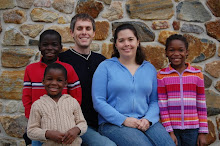I spent a good deal of time at the conference in my room – specifically, the bathroom. I went over a little bit ill but thought nothing of it. Unfortunately, I was sick a good portion of the conference and was only able to attend the sessions by not eating for about two days. (For me to not eat, you know I was really sick.) It could have been something I picked up in
As a result, I thought I should share with you my suggestions for international travel:
- Several weeks before you go, start eating “healthy yogurt.” Something with live yogurt cultures will help build up good bacteria in your system. If you can get it, kefir is even better for this.
- Take Pepto-Bismol with you and use it regularly. This will coat you stomach lining and give added protection against local bugs. I breezed through a trip to
- No matter how good the food being sold on the street looks, don’t buy it. (I have managed to resist the heavenly smells so far, but I am always tempted.)
- “Boil it, fry it, peel it, or forget it.”
Now back to the point. When the conference ended, the rest of the Westerners piled into small buses with too many bodies and way too much luggage for some very long road trips to
Worldlink has connected our church in NJ with one of SU's ministers, Dickens Zziwa Ssenyonjo. I was able to spend the day with Dickens and some other staff people before they dropped me at the airport. I even had the chance to meet Dickens’ wife just a couple of weeks before they had their first child, a boy named Jeremy Reynolds. I was able to take a short video of Dickens describing the benefits of Worldlink’s partnership. It is available on Worldlink's website (or was until the ice storms cut off power to our hosting service in Tulsa). As soon as the site is up again, I'll post the link. It is well worth 2 minutes to watch.
Having lunch with Dickens and another minister named Frank Nkandu was interesting. When we walked into the restaurant to get our food, the tables in the courtyard were all reserved. When Dickens, Frank, and the white man walked back out, the best table was suddenly available. When we all ordered fruit juice, mine was half again as large as theirs. I was uncomfortable with that, so I asked the waitress to bring them the larger glasses as well. I’m glad they took my
Those are some of the highlights from the Uganda trip. It would be impossible to describe the entire trip adequately - the friendships, the food, the discussions, and the worship. (Nothing makes me feel more rhythmically challenged than worshiping with Africans!) If the muse strikes me, I might try to write a little about reconciliation and some of the other things we discussed, but you should go experience it for yourself. The next conference is in Rwanda. Sign up here.





1 comment:
I loved this comment you made: "This difference is one reason Worldlink's vision and programs are so essential to the kingdom. The gospel is shared by local people, with local sensitivities and experience, and it can be heard clearly and without pressure to please a foreigner." Isn't that how it should be - local people, local sensitivities, local experience. Isn't that why Jesus came like He did? That is so awesome! I'm so glad y'all are involved with this organization. Revolutionary.
Post a Comment